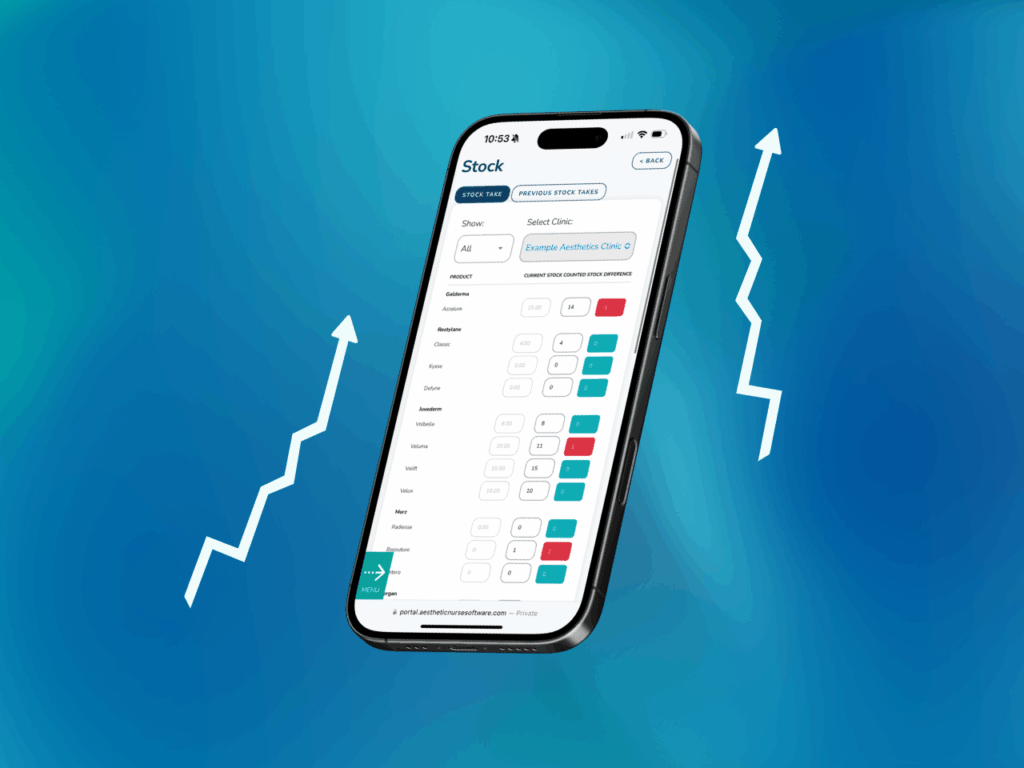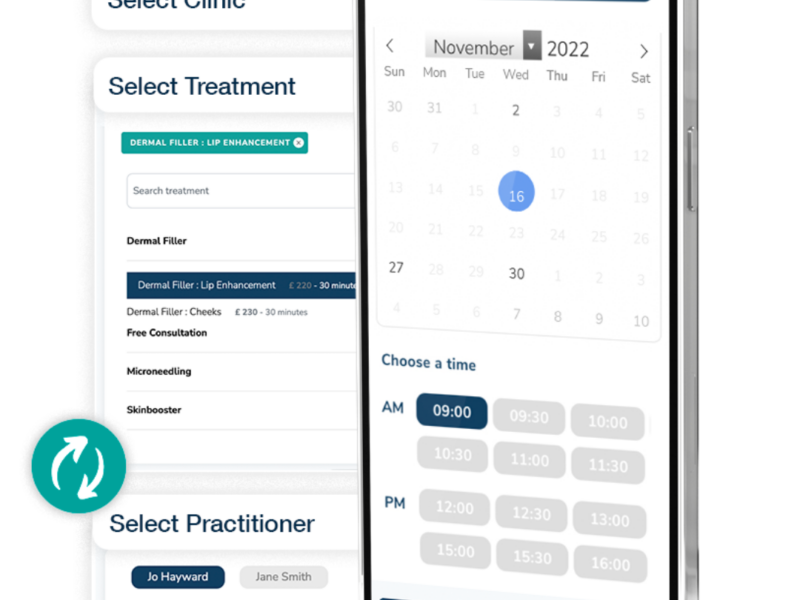
Is communication the key to success of your aesthetics business?
April 19, 2022
How can you retain your patients?
June 16, 2022Should you be charging deposits?
You know the frustration! A patient books an anti-wrinkle treatment only to later cancel on you, leaving you with prescribed, expensive unused products. Or maybe you’ve received three cancellations in two days and are now thinking about how this will affect your business and future income if these cancellations continue.

Max Hayward • May 24 2022
Maybe you’ve considered taking deposits for your appointments previously but have hesitated because you don’t want to put off new patients with upfront costs. Deposits are a hot topic within the industry with more practitioners now considering adding this element to their booking process.
Patients that fail to arrive after booking an appointment are a bugbear for practitioners across the aesthetics industry, but could charging a deposit be the answer to this problem?
In this blog we’ll take a look at what deposits are and whether they can help your business.
What is a deposit?
A deposit is a small payment taken off the total cost of the treatment at point of booking. They’re designed to safeguard a portion of your income, time and cover the cost of any products that have been ordered specifically for that appointment. Deposits are usually charged at point of booking to secure the time and date for the appointment and can either be refundable or non-refundable, typically it is taken off the total cost of the treatment.
There are 3 main methods used to take deposits for your appointments:
- Bank Transfer
- Via Secure online-booking systems
- Cash
Why should I introduce deposits into my clinic?
1. Protects your valuable time
As an independent, service-based business your time IS your business, so it is vital that you have processes in place to protect it, to ensure you can maximise the return for your time. Deposits can protect your time because even though you may not receive the full treatment payment, you are guaranteed to receive a small percentage of the treatment cost for your time and knowledge. So, if a patient doesn’t turn up, you are compensated for your time.
2. Reduce no-shows and late cancellations
There is nothing more annoying than a patient not turning up for their appointments or receiving a last-minute cancellation. They can be very costly for small businesses, let’s say you have one no-show appointment each week for an anti-wrinkle treatment in two areas of the face. A conservative charge for this appointment is £150, that’s £600 a month and £7,200 a year!
Charging a deposit significantly increases the likelihood of a patient attending their appointment because they know the deposit will be lost if they don’t show up or cancel last minute.
3. Stops time wasters from booking
If they are intending to show up for an appointment, patients shouldn’t have an issue with paying a small deposit. The only patients who question paying a deposit are those that are more likely to cancel last minute or not show up for the appointment. Precisely the patient you want to collect a deposit from or avoid completely! Don’t forget deposits are not an additional charge, they are just a small part of the treatment cost.
4. Supports cashflow
As an independent business your time and cash flow are vital to your business, especially when first starting out. Deposits can support you with your cash flow by providing funds to cover the costs of expensive products required for the treatment. This reduces the risk for your business as you have received a small payment in advance instead of having to use money out of your own pocket. This can also be beneficial to your patients as it allows them the opportunity to spread the cost of a more expensive treatments over two payments.
Why shouldn’t I charge a deposit?
You may be thinking deposits are just what my business needs to reduce my no shows and cancellations. However, you’re concerned that adding a deposit function within your business creates friction and additional admin tasks.
Some common objections and misconceptions about charging a deposit:
“I’ve never charged deposits; it will put my patients off”
Many practitioners worry that potential patients will be put off by paying an upfront deposit for their services. But think about your own experiences, when you book a hotel online and pay a deposit to secure the booking you don’t question the deposit amount or even hesitate to look elsewhere for a hotel which does not charge a deposit. You choose the hotel based on the service they offer and its reviews. This is the same principle for your clinic. Patients should be choosing your clinic for the services you offer and the results you produce.
As a business owner, this could be an opportunity to consider the type of customers you want to attract. Deposits can help to attract more committed patients who have an increased level of intent to attend their appointment. However, as a newly established business in a competitive environment, it may be worth weighing up whether you are looking to attract a smaller graphic of committed patients against a larger potential patient base with unknown commitment.
“I’ll spend time chasing deposits”
Now, you may already request deposits or have colleagues that do, but if this method is through bank transfers, it can be a time-consuming process to keep on top of, chasing payments before the appointment and refunding if they cancel with sufficient notice.
Using an online booking system can allow you to charge patients a deposit at the time of booking to secure their appointment, stating your cancellation policy which patients must agree to before their booking is complete. With online booking, appointments aren’t secured until a deposit is paid.
The truth is, there can be some admin involved in deposit collections, which is why you should have a system in place to manage this. It should be easy to see who has paid a deposit and how much, and easily be able to transfer to a new appointment if they reschedule. Managing this manually can be stressful and no-one wants to have the awkward conversation with your patient of ‘Have you paid a deposit?’
So, consider utilising a booking system that has deposit collection built in.
How much should I charge?
This depends on the services you offer, your patients demographic and even your location. Maybe you consider only charging deposits for your higher priced treatments or the treatments that take up the most amount of your time. Alternatively, you could charge deposits based on a percentage of treatment cost, this way you protect your time for all appointments but charge smaller deposits for cheaper treatments.
Aesthetic Nurse Software offers flexible deposit options, including the choice to charge a deposit for any treatment bookings but excludes ‘consultation’ bookings. Therefore, still attracting new patients for a free consultation but your business is covered against late cancellations for your high-ticket treatments.
You may not feel comfortable implementing a “one size fits all” policy. Which is fine! Your deposit policy can be robust but fair, to suit not only your business needs but also your patients. You can make exceptions for certain circumstances. However, be ready for patients to challenge your policy. Maybe within your deposit policy you include the option for deposits to be transferrable against another treatment, this way you can keep the deposit and keep the potential patient
How would I implement a deposit function in my business?
After weighing up the pros and cons of charging deposits, if you decide that deposits are the way forward for your business, Aesthetic Nurse Software (ANS) is here to help you get started. Within ANS you can take deposits for any online bookings that are received. You have complete control over how much to charge and when to charge it.
You can choose which treatments require a deposit to be paid, meaning you can request a deposit for a Dermal Filler appointment but not a Chemical Peel or even set your initial consultations at a fixed price that can be redeemed against a treatment if the patient decides to continue with treatment. Through ANS deposits can be set at either a fixed amount (e.g. £30) across all treatments or a specific percentage of a treatment cost (e.g. 20%).
You may be wondering whether ANS can accommodate refunding a deposit when an appointment is cancelled outside of your cancellation policy. The answer is Yes, in a few simple clicks your deposit can be refunded straight back to your patient’s bank account. What about when an appointment is rescheduled? Yes, when an appointment is rescheduled in ANS, the deposit is transferred to the new appointment, meaning you can easily see who has paid a deposit and how much.
So, should you start charging deposits in your aesthetics business?
To conclude, charging a deposit can be a difficult decision for many practitioners out of fear that patients will stop booking with them or it may be time-consuming to manage. However, deposits are an excellent way to prevent the loss of income and time if a no-show or a late cancellation does happen, not to mention reducing the likelihood of this situation occurring dramatically.
Whilst it can be daunting, it will soon be the norm for your patients to expect to pay a deposit with you and you’ll be glad that you no longer need to worry about being left with appointment gaps that can’t be filled.
If you would like to find out more on how ANS can help introduce deposits into your business, please feel free to drop us an email: info@aestheticnursesoftware.com
Click here to start a free trial today and find out!
Max Hayward, Co-founder of Aesthetic Nurse Software

















